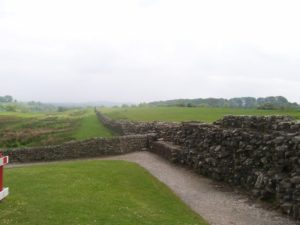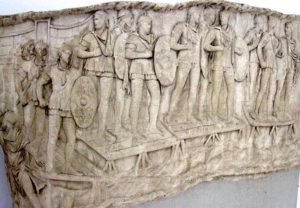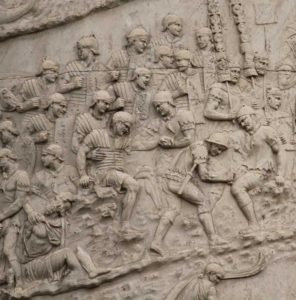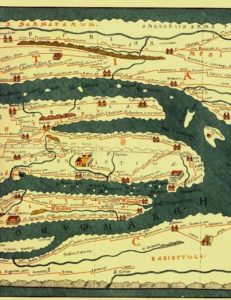Projekttitel: eManual Alte Geschichte
Modul [optional]:
Autor_in: Plinius der Jüngere
Lizenz: CC-BY-NC-SA
Plin.epist. 6,20 – Original:
(1) Ais te adductum litteris, quas exigenti tibi de morte avunculi mei scripsi, cupere cognoscere, quos ego Miseni relictus – id enim ingressus abruperam – non solum metus verum etiam casus pertulerim. Quamquam animus meminisse horret, incipiam.
(2) Profecto avunculo ipse reliquum tempus studiis – ideo enim remanseram – impendi; mox balineum cena somnus inquietus et brevis. (3) Praecesserat per multos dies tremor terrae, minus formidolosus, quia Campaniae solitus; illa vero nocte ita invaluit, ut non moveri omnia sed verti crederentur. (4) Irrupit cubiculum meum mater; surgebam invicem, si quiesceret excitaturus. Resedimus in area domus, quae mare a tectis modico spatio dividebat. (5) Dubito, constantiam vocare an imprudentiam debeam – agebam enim duodevicensimum annum – : posco librum Titi Livi, et quasi per otium lego atque etiam, ut coeperam, excerpo. Ecce amicus avunculi, qui nuper ad eum ex Hispania venerat, ut me et matrem sedentes, me vero etiam legentem videt, illius patientiam securitatem meam corripit. Nihilo segnius ego intentus in librum.
(6) Iam hora diei prima, et adhuc dubius et quasi languidus dies. Iam quassatis circumiacentibus tectis, quamquam in aperto loco, angusto tamen, magnus et certus ruinae metus. (7) Tum demum excedere oppido visum; sequitur vulgus attonitum, quodque in pavore simile prudentiae, alienum consilium suo praefert, ingentique agmine abeuntes premit et impellit. (8) Egressi tecta consistimus. Multa ibi miranda, multas formidines patimur. Nam vehicula, quae produci iusseramus, quamquam in planissimo campo, in contrarias partes agebantur, ac ne lapidibus quidem fulta in eodem vestigio quiescebant. (9) Praeterea mare in se resorberi et tremore terrae quasi repelli videbamus. Certe processerat litus, multaque animalia maris siccis harenis detinebat. Ab altero latere nubes atra et horrenda, ignei spiritus tortis vibratisque discursibus rupta, in longas flammarum figuras dehiscebat; fulguribus illae et similes et maiores erant. (10) Tum vero idem ille ex Hispania amicus acrius et instantius ‚Si frater‘ inquit ‚tuus, tuus avunculus vivit, vult esse vos salvos; si periit, superstites voluit. Proinde quid cessatis evadere?‘ Respondimus non commissuros nos, ut de salute illius incerti nostrae consuleremus. (11) Non moratus ultra proripit se effusoque cursu periculo aufertur. Nec multo post illa nubes descendere in terras, operire maria; cinxerat Capreas et absconderat, Miseni quod procurrit, abstulerat. (12) Tum mater orare, hortari, iubere, quoquo modo fugerem: posse enim iuvenem, se et annis et corpore gravem bene morituram, si mihi causa mortis non fuisset. Ego contra salvum me nisi una non futurum; dein manum eius amplexus addere gradum cogo. Paret aegre incusatque se, quod me moretur.
(13) Iam cinis, adhuc tamen rarus. Respicio: densa caligo tergis imminebat, quae nos torrentis modo infusa terrae sequebatur. ‚Deflectamus‘ inquam ‚dum videmus, ne in via strati comitantium turba in tenebris obteramur.‘ (14) Vix consideramus, et nox – non qualis illunis aut nubila, sed qualis in locis clausis lumine exstincto. Audires ululatus feminarum, infantum quiritatus, clamores virorum; alii parentes alii liberos alii coniuges vocibus requirebant, vocibus noscitabant; hi suum casum, illi suorum miserabantur; erant, qui metu mortis mortem precarentur. (15) Multi ad deos manus tollere, plures nusquam iam deos ullos aeternamque illam et novissimam noctem mundo interpretabantur. Nec defuerunt, qui fictis mentitisque terroribus vera pericula augerent. Aderant, qui Miseni illud ruisse illud ardere falso sed credentibus nuntiabant. (16) Paulum reluxit, quod non dies nobis, sed adventantis ignis indicium videbatur. Et ignis quidem longius substitit; tenebrae rursus cinis rursus, multus et gravis. Hunc identidem assurgentes excutiebamus; operti alioqui atque etiam oblisi pondere essemus. (17) Possem gloriari non gemitum mihi, non vocem parum fortem in tantis periculis excidisse, nisi me cum omnibus, omnia mecum perire misero, magno tamen mortalitatis solacio credidissem.
(18) Tandem illa caligo tenuata quasi in fumum nebulamve discessit; mox dies verus; sol etiam effulsit, luridus tamen qualis esse, cum deficit, solet. Occursabant trepidantibus adhuc oculis mutata omnia altoque cinere tamquam nive obducta. (19) Regressi Misenum curatis utcumque corporibus suspensam dubiamque noctem spe ac metu exegimus. Metus praevalebat; nam et tremor terrae perseverabat, et plerique lymphati terrificis vaticinationibus et sua et aliena mala ludificabantur.
(20) Nobis tamen ne tunc quidem, quamquam et expertis periculum et exspectantibus, abeundi consilium, donec de avunculo nuntius.
Haec nequaquam historia digna non scripturus leges et tibi scilicet, qui requisisti, imputabis, si digna ne epistula quidem videbuntur. Vale.
Text zum downloaden
Projekttitel: eManual Alte Geschichte
Modul [optional]:
Übersetzung: J.B. Firth
Lizenz: CC-BY-NC-SA
Übersetzung:
You say that the letter which I wrote to you at your request, describing the death of my uncle, * has made you anxious to know not only the terrors, but also the distress I suffered while I remained behind at Misenum. I had indeed started to tell you of these, but then broke off. Well, „though my mind shudders at the recollection, I will essay the task“. **
After my uncle had set out I employed the remainder of the time with my studies, for I had stayed behind for that very purpose. Afterwards I had a bath, dined, and then took a brief and restless sleep. For many days previous there had been slight shocks of earthquake, which were not particularly alarming, because they are common enough in Campania. But on that night the shocks were so intense that everything round us seemed not only to be disturbed, but to be tottering to its fall. My mother rushed into my bedchamber, just as I myself was getting up in order to arouse her if she was still sleeping. We sat down in the courtyard of the house, which was of smallish size and lay between the sea and the buildings. I don’t know whether my behaviour should be called courageous or rash – for I was only in my eighteenth year – but I called for a volume of Titus Livius, and read it, as though I were perfectly at my ease, and went on making my usual extracts. Then a friend of my uncle’s, who had but a little time before come to join him from Spain, on seeing my mother and myself sitting there and me reading, upbraided her for her patience and me for my indifference, but I paid no heed, and pored over my book.
It was now the first hour of the day, but the light was still faint and weak. The buildings all round us were beginning to totter, and, though we were in the open, the courtyard was so narrow that we were greatly afraid, and indeed sure of being overwhelmed by their fall. So that decided us to leave the town. We were followed by a distracted crowd, which, when in a panic, always prefers someone else’s judgment to its own as the most prudent course to adopt, and when we set out these people came crowding in masses upon us, and pressed and urged us forward. We came to a halt when we had passed beyond the buildings, and underwent there many wonderful experiences and terrors. For although the ground was perfectly level, the vehicles which we had ordered to be brought with us began to sway to and fro, and though they were wedged with stones, we could not keep them still in their places. Moreover, we saw the sea drawn back upon itself, and, as it were, repelled by the quaking of the earth. The shore certainly was greatly widened, and many marine creatures were stranded on the dry sands. On the other side, the black, fearsome cloud of fiery vapour burst into long, twisting, zigzag flames and gaped asunder, the flames resembling lightning flashes, only they were of greater size. Then indeed my uncle’s Spanish friend exclaimed sharply, and with an air of command, to my mother and me, „If your brother and your uncle is still alive, he will be anxious for you to save yourselves; if he is dead, I am sure he wished you to survive him. Come, why do you hesitate to quit this place?“ We replied that we could not think of looking after our own safety while we were uncertain of his. He then waited no longer, but tore away as fast as he could and got clear of danger.
Soon afterwards the cloud descended upon the earth, and covered the whole bay ; it encircled Capri and hid it from sight, and we could no longer see the promontory of Misenum. Then my mother prayed, entreated, and commanded me to fly as best I could, saying that I was young and could escape, while she was old and infirm, and would not fear to die, if only she knew that she had not been the cause of my death. I replied that I would not save myself unless I could save her too, and so, after taking tight hold of her hand, I forced her to quicken her steps. She reluctantly obeyed, accusing herself for retarding my flight. Then the ashes began to fall, but not thickly: I looked back, and a dense blackness was rolling up behind us, which spread itself over the ground and followed like a torrent. „Let us turn aside,“ I said, „while we can still see, lest we be thrown down in the road and trampled on in the darkness by the thronging crowd.“ We were considering what to do, when the blackness of night overtook us, not that of a moonless or cloudy night, but the blackness of pent-up places which never see the light. You could hear the wailing of women, the screams of little children, and the shouts of men ; some were trying to find their parents, others their children, others their wives, by calling for them and recognising them by their voices alone. Some were commiserating their own lot, others that of their relatives, while some again prayed for death in sheer terror of dying. Many were lifting up their hands to the gods, but more were declaring that now there were no more gods, and that this night would last for ever, and the end of all the world. Nor were there wanting those who added to the real perils by inventing new and false terrors, for some said that part of Misenum was in ruins and the rest in flames, and though the tale was untrue, it found ready believers.
A gleam of light now appeared, which seemed to us not so much daylight as a token of the approaching fire. The latter remained at a distance, but the darkness came on again, and the ashes once more fell thickly and heavily. We had to keep rising and shaking the latter off us, or we should have been buried by them and crushed by their weight. I might boast that not one groan or cowardly exclamation escaped my lips, despite these perils, had I not believed that I and the world were perishing together – a miserable consolation, indeed, yet one which a mortal creature finds very soothing. At length the blackness became less dense, and dissipated as it were into smoke and cloud ; then came the real light of day, and the sun shone out, but as blood-red as it appears at its setting. Our still trembling eyes saw that everything had been transformed, and covered with a deep layer of ashes, like snow. Making our way back to Misenum, we refreshed our bodies as best we could, and passed an anxious, troubled night, hovering between hope and fear. But our fears were uppermost, for the shocks of earthquake still continued, and several persons, driven frantic by dreadful prophecies, made sport of their own calamities and those of others. For our own part, though we had already passed through perils, and expected still more to come, we had no idea even then of leaving the town until we got news of my uncle.
You will not read these details, which are not up to the dignity of history, as though you were about to incorporate them in your writings, and if they seem to you to be hardly worth being made the subject of a letter, you must take the blame yourself, inasmuch as you insisted on having them. Farewell.
Text zum downloaden
Projekttitel: eManual Alte Geschichte
Modul [optional]:
Autor_in: Nathalie Klinck
Lizenz: CC-BY-NC-SA
Plin.epist. 6,20
Leitfragen:
1) Wie beschreibt Plinius den Ausbruch des Vulkans?
2) Welche Charakteristika der antiken Briefschreibung werden deutlich?
3) Welche Funktion hatte die Briefschreibung in der Antike inne?
Kommentar:
Bei der vorliegenden Quelle handelt es sich um einen Brief (lat. epistula) von Plinius d.J. (ca. 62-114 n. Chr.) aus dem 1. Jh. n. Chr., in welchem er als Augenzeuge über die Begebenheiten beim Ausbruch des Vesuvs 79 n. Chr. berichtet. Briefe wurden in der Antike in der Regel auf Holztäfelchen oder auf Papyrus verfasst und waren oftmals eine Sache des öffentlichen Lebens. Sie wurden mit Freunden, der Familie und dem Bekanntenkreis geteilt und bei verschiedenen Gelegenheiten verlesen oder sogar kopiert. Dabei ist die literarische Gattung der Briefschreibung eine schwer zu greifende, denn Briefe umfassten amtliche und öffentliche Schreiben, wie Gesetzte und offizielle Erlasse, private Korrespondenzen von Individuen untereinander, Lehr- oder Kunstbriefe, Geschäftsbriefe, Widmungsbriefe zu versendeten literarischen Werken, (Privat)Briefe, die mit der Absicht zur Publikation verfasst wurden etc. In diese letzte Kategorie fällt wahrscheinlich auch der hier dargestellte Brief. Bereits in der Antike wurden teilweise ganze Briefsammlungen ediert und herausgegeben – unter Umständen hat auch Plinius d.J. seine Briefe mit der Intention zur Veröffentlichung verfasst.
Plinius d.J. war römischer Aristokrat und durchlief eine Ämterlaufbahn im Sinne des cursus honorum. Er gibt in der Einleitung des Briefes an, dass er das Schreiben auf Nachfrage des Empfängers verfasst hätte. Es wird deutlich, dass er diesen in einem vorausgegangenen Bericht bereits über den Tod seines Onkels Plinius d.Ä. informiert hatte. Dieser kam bei dem Vulkanausbruch nahe der Stadt Pompeji ums Leben. Dabei war sein wissenschaftlicher Forschungsdrang wohl ein nicht zu unterschätzender Faktor für sein Ableben, denn er war in seiner Funktion als Naturforscher – schließlich ist der auch Verfasser der Naturalis historia bekannt – in Richtung des Vulkans aufgebrochen, um diesem Phänomen auf den Grund zu gehen.
Plinius d.J. selbst befand sich in den Tagen kurz vor dem Ausbruch gemeinsam mit seinem Onkel und seiner Mutter in Misenum, einer Stadt, die ebenfalls am Golf von Neapel situiert war. An dem in dem Brief beschriebenen Tag verblieben seine Mutter und er in ihrer Landvilla und wurden von dort aus Zeugen der Eruption des Vulkans. Diese kündigte sich durch äußerst starke Erdbeben an, gefolgt von einer gewaltigen Aschewolke, die aus dem Krater aufstieg und von Gesteinsexplosionen durchzogen war. Diese besonders explosive Art des Vulkanausbruchs, der mit einem außerordentlich großen Ascheregen einhergeht wurde in der modernen Forschung auch bei anderen Vulkanen beobachtet und aufgrund dieser ersten schriftlichen Überlieferung als plinianische Eruption bekannt.
Plinius d.J. und seine Mutter entschlossen sich die Stadt zu verlassen, da sich der Ascheregen unaufhaltsam näherte und begann sich über das Land und die See zulegen. Deutlich wird in der Beschreibung dieser Katastrophe zum einen das Chaos, welches in der Stadt entstand, zum anderen die Schnelligkeit mit der dies passierte. Er beschreibt, dass sie so schnell von dem schweren Ascheregen eingeschlossen wurden, dass sie sich nur durch ständiges Abschütteln des vulkanischen Materials davor retten konnten, lebendig begraben zu werden. Diese Beschreibung erklärt auch die archäologischen Funde von menschlichen Überresten in Pompeji und Herkulaneum, die quasi eine Momentaufnahme der Menschen zu ihrem Todeszeitpunkt darstellen. Im Gegensatz dazu löste sich allerdings die Aschwolke über Misenum bald auf, wahrscheinlich weil der Wind drehte, und ließ eine allesüberdeckende weiße Schicht aus Asche und Menschen in Panik zurück. Plinius d.J. und seine Mutter kehrten, immer noch in Sorge um den Onkel, in die Villa zurück. Erst nach und nach werden die Ausmaße dieser Katastrophe bekannt geworden sein und auch erst nach dieser bangen Nacht werden Plinius d.J. und seine Mutter sich sicher geworden sein, dass der Onkel im Hause eines Freundes umgekommen ist.
Neben diesen historisch hoch interessanten Informationen gibt Plinius d.J. allerdings auch einen Einblick in die Typologie der antiken Briefschreibung. Diese war geprägt von diversen Stilmitteln, wie Metaphern und dem Rückgriff auf wörtliche Rede. Nicht zuletzt waren Briefe immer auch – insbesondere, dann wenn diese einem größeren Adressatenkreis dienten – ein literarisches Aushängeschild der rhetorischen Fähigkeiten des Verfassers. Der Inhalt war demnach oftmals nicht nur von einer beeindruckenden Stilistik geprägt, sondern auch immer im Bewusstsein der Selbstdarstellung des Autors verfasst. Deutlich wird dies in den verwendeten literarischen Topoi, wie sie Plinius d.J. beispielsweise im Schlusswort aufgreift.
Briefe dienten demnach nicht einfach nur als Medium der Informationsweitergabe, sondern konnten abhängig von dem jeweiligen (Brief)Genre als private oder öffentliche Korrespondenz fungieren, die oftmals vor allem der Selbstdarstellung des Verfassers diente. Es ist demnach kaum verwunderlich, dass insbesondere die Briefkorrespondenzen von antiken Autoren, wie Plinius d.J. oder Cicero, die Autoren der Frühen Neuzeit und der Renaissance beeindruckten und diese die Stilistik der Schriften nachahmten. Für die heutige Forschung sind die überlieferten Briefe ein wichtiges Zeugnis für das (alltägliche) Leben und die Gedankenwelt der Menschen in der Antike.
Text zum downloaden
Podcast-Hinweise
Sehen Sie zu dieser Quelle auch den Podcast „Die Literatur der Kaiserzeit“. Um einen breiteren Einblick in die Kaiserzeit zu erhalten, sehen Sie auch die Podcastreihe „Römische Geschichte II – Kaiserzeit“.









